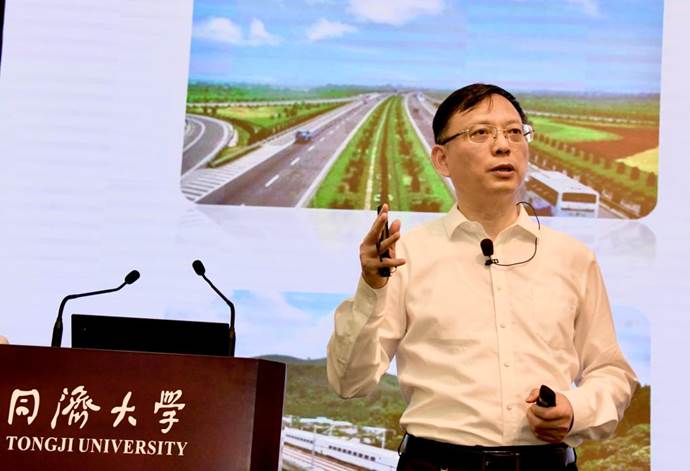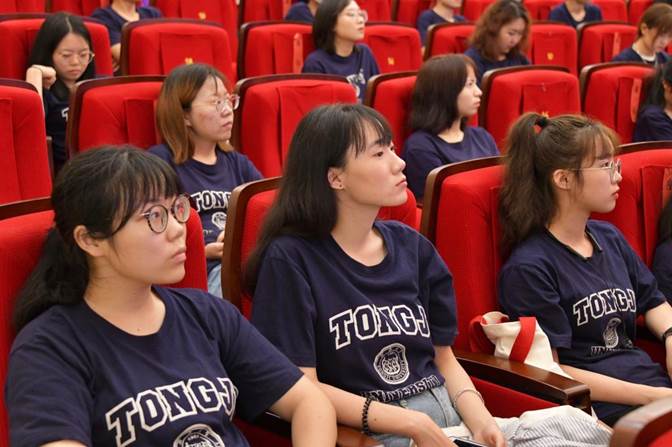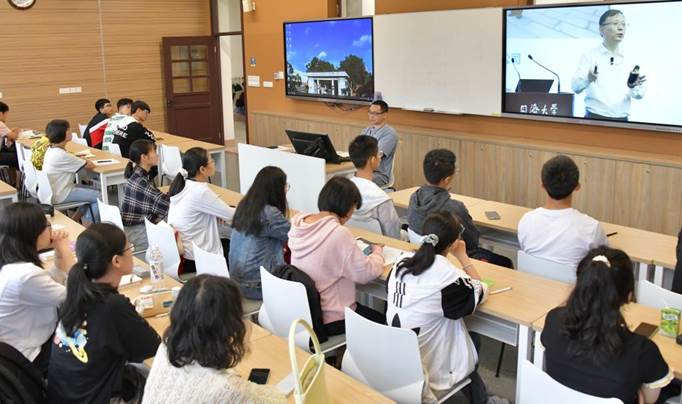On the afternoon of September 15, Tongji’s Party Secretary FANG Shouen gave the first lesson to all undergraduate freshmen as the first guest speaker to lecture on the "Chinese Road" for this semester. He explained the great advantages of the socialist path with Chinese characteristics based on the development of China's transportation system and the close relationship between transportation and socio-economic development, demonstrating the great achievements of China's transportation. He also encouraged the students to be confident in our Party's chosen path, to be ambitious in strengthening our nation, and to develop strong skills so as to contribute our youth to the realization of the Two Centennial Goals and the Chinese dream of the great rejuvenation of the Chinese nation. All of 2020's undergraduates at our University listened to the lecture, either on site or in the smart classroom through the online livestreaming system.
FANG Shouen first started with the relationship between transportation and human society. He said transportation is closely related to the development of human society. Socio-economic development puts forward demands on transportation, creating the revolution in transportation, bringing about infrastructure improvements, and thus expanding further the scope of human activities and then putting forward new requirements for transportation. Transportation has changed the political and economic structure of the world. Transportation science and technology has accelerated the evolution of human civilization, serving as an important part of human progress in science and technology. Transportation has also promoted economic and cultural exchanges.

Party Secretary FANG Shouen lecturing to freshmen
FANG Shouen used the New China's highway development and comprehensive transportation infrastructure network as examples to illustrate the world-renowned achievements of China's transportation system. He said that China has always adhered to the people-oriented development of transportation, and has always guaranteed and improved people's livelihood in its development. After several generations of hard and continuous efforts, China's transportation landscape has undergone historic changes, and China has moved from a major transport country to a transport power.
FANG Shouen described the wisdom of Tongji on the main battlefield of our country's transportation construction. Tongji people are active in the construction of expressways, high-speed railways, airports, urban rail transit operation and management, urban traffic organization and management optimization, and urban intelligent transportation systems. Taking the old principal that LI Guohao, a group of alumni such as LI Jincheng, ZHU Yongling, and the University's surveying, mapping, and remote sensing team as examples, FANG Shouen presented the important contributions made by generations of Tongji people to the construction of the Nanpu Bridge, The Qinghai-Tibet Railway, the Hong Kong-Zhuhai-Macao Bridge, Beijing Daxing International Airport, the lunar exploration project, and other major national projects. He pointed out transportation is related to civil engineering, bridge and tunnel engineering, automobile, electronic information, environment, design, law, humanities, medicine and other disciplines, all of which can prompt the development of China's transportation.
FANG Shouen introduced to the students the Outlines for Building a Transport Power, printed and issued by the Central Committee of the CPC and the State Council in September 2019. The Outlines call for China to build a safe, convenient, efficient, green, and economical modern comprehensive transportation system, and to build itself into a transport power that satisfies the people, has strong security, and ranks among the world's top transport powers. Respectively, FANG Shouen interpreted nine key tasks in the Outlines, including infrastructure, transportation equipment, transportation services, technological innovation, safety assurance, green development, open cooperation, talent team, and a governance system. He also introduced China's Highway Network Planning (2013-2030) and the Integrated Development Plan for Higher Quality Transportation in the Yangtze River Delta Region, issued by the National Development and Reform Commission and the Ministry of Transport in April of this year.

Students listening to the lecture
FANG Shouen looked ahead to the future of transportation. He said transportation in the future will become increasingly automated, electrified, networked, and shared with the support of big data and artificial intelligence. Unmanned driving, vehicle-to-vehicle communication, smart trains, underground self-parking, smart pedestrian crossings will become the future norm. The future of transportation has unlimited possibilities. He finally pointed out that building a strong transport country is an important support for taking the Chinese Road and an inevitable requirement for socio-economic development into the new era. We must deepen the international cooperation in the field of transportation and build a global, mutually beneficial, win-win transportation system through open cooperation. The development of transportation will eventually unite a "Community with a Shared Future for Humanity."
"In listening to Professor FANG's lecture, I can't help being shocked by the rapid development of transportation and be proud of the prosperity of our country's transportation industry. As a member of the Intelligent Transportation and Vehicle Category, I want to study hard and make due contributions to the motherland's transportation cause. I shall strive hard for our country's great goal of becoming a transport power!" said GUO Jiaxin in the Intelligent Transportation and Vehicles Category of the Jimei Academy of the Freshmen College.
LI Yi, a 2020 postgraduate student at the School of Marxism, said: "The development of China's modern transport industry is a testament of the development of socialism with Chinese characteristics and to the process of Chinese people heading step-by-step towards a well-off life. Secretary FANG’s lecture not only aroused my pride as one of the Tongji people, but also made me feel the mission entrusted by the times."

Lecture broadcast live online
The "Chinese Road" is one of the "Chinese Series" Ideological and Political elective courses set up by the University, based on the characteristics of the University's disciplines for all students. According to the Dean of the School of Marxism XU Rong, this semester's "Chinese Road" course will focus on demonstrating China's practical and theoretical achievements in seven fields, including road transportation, artificial intelligence, urban and rural construction, economic development, engineering construction, foreign communication, and medical development. School leaders will be invited to give lectures, separately. Not only are these school leaders well-known scholars in their specific research field, but they are also leaders of China’s key universities. Aside from being able to explain the development path and achievements of our country in different fields since the reform and opening up from a professional perspective, students can learn from them the demeanor of professional elites and industry leaders. This course involves another exploration of combining ideological and political courses with professional courses.
Text by AI Jiao,
Photo by JIANG Ping,
Video by SONG Yuxing, WU Yixiang and LI Hua
Source: https://news.tongji.success.cn/info/1002/74946.htm